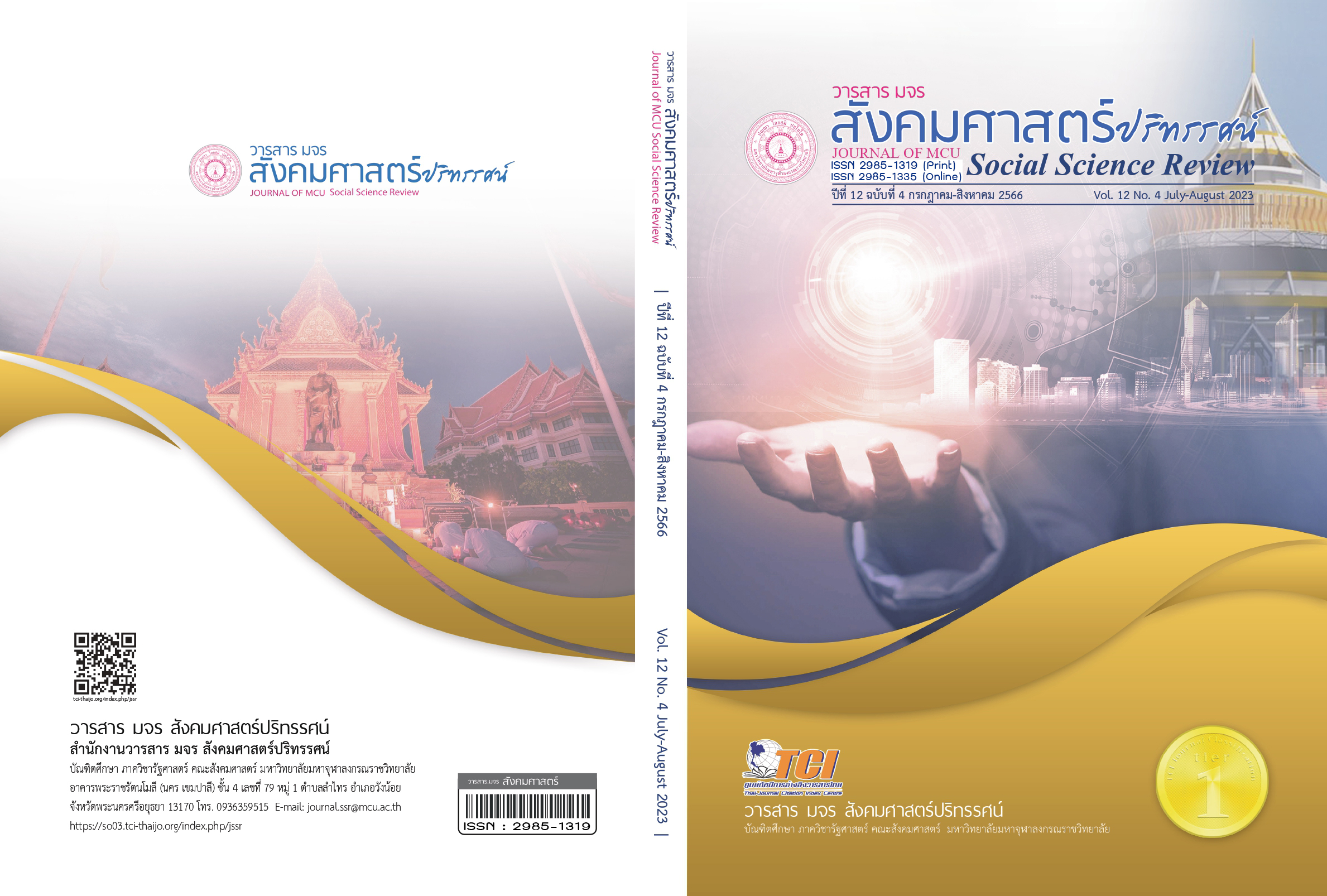การพัฒนาทุนมนุษย์ของบุคลากรเทศบาล ในจังหวัดสุพรรณบุรี
คำสำคัญ:
การพัฒนา, ทุนมนุษย์, บุคลากรเทศบาล, ไตรสิกขาบทคัดย่อ
บทความวิจัยนี้มีวัตถุประสงค์เพื่อศึกษาการพัฒนาทุนมนุษย์ศึกษาปัจจัยที่ส่งผลต่อการพัฒนาทุนมนุษย์ และนำเสนอการพัฒนาทุนมนุษย์ของบุคลากรเทศบาล ศึกษาโดยระเบียบวิธีวิจัยเป็นแบบผสานวิธี การวิจัยเชิงปริมาณเก็บข้อมูลด้วยแบบสอบถามที่มีค่าความเชื่อมั่นทั้งฉบับเท่ากับ 0.952 เก็บข้อมูลจากกลุ่มตัวอย่าง คือ บุคลากรจำนวน 400 คน วิเคราะห์ข้อมูลโดยหาค่าความถี่ ค่าร้อยละ ค่าเฉลี่ย ส่วนเบี่ยงเบนมาตรฐานและ One way ANOVA การวิจัยเชิงคุณภาพ เก็บข้อมูลด้วยแบบสัมภาษณ์เชิงลึกที่มีโครงสร้างแบบต่อตัว กับผู้ให้ข้อมูลสำคัญ จำนวน 20 และจากผู้มีส่วนร่วมในการสนทนากลุ่มเฉพาะ จำนวน 9 รูปหรือคน วิเคราะห์ข้อมูลโดยการพรรณนาความ
ผลการวิจัยพบว่า การพัฒนาทุนมนุษย์ของบุคลากรเทศบาลมีการพัฒนาในระดับมากทุกด้าน ปัจจัยที่ส่งผลต่อการพัฒนาบุคลากรมี 2 ปัจจัย คือปัจจัยภายนอก และปัจจัยภายใน ส่วนแนวทางการพัฒนาทุนมนุษย์ตามแนวคิดของ Lenard Nadler และไตรสิกขา มีความเหมาะสมในระดับมาก มีค่าเฉลี่ยรวมที่ 3.52 ด้านที่มีการปฏิบัติสูงสุดได้แก่ เทศบาลมีการส่งเสริมให้บุคลากรฝึกอบรมให้มีความชำนาญเฉพาะทาง มีค่าเฉลี่ยที่ 3.72 เทศบาลมีนโยบายพัฒนาทุนมนุษย์ของบุคลากรอย่างชัดเจน ส่งเสริมให้บุคลากรศึกษาต่อในสายอาชีพและทั่วไปสูงขึ้น เทศบาลพาบุคลากรเข้าวัดทำบุญตามเทศกาล ฝึกอบรมตามหลักเบญจศีลเบญจธรรม มีการฝึกอบรมพัฒนาสติ สมาธิและปัญญา โดยรวมมีค่าเฉลี่ยในระดับมากมีค่าเฉลียอยู่ที่ 3.69 ถึง 3.57
เอกสารอ้างอิง
พระพรหมคุณาภรณ์ (ป.อ.ปยุตโต). (2547). หลักแม่บทของการพัฒนาตน. กรุงเทพฯ: โรงพิมพ์มหาจุฬาลงกรณราชวิทยาลัย.
วิชญาภา เมธีวรฉัตร. (2558). รูปแบบการพัฒนาทรัพยากรมนุษย์เชิงพุทธของมหาวิทยาลัยราชภัฎภาคเหนือตอนล่าง 2 (ดุษฎีนิพนธ์พุทธศาสตร์ดุษฎีบัณฑิต สาขาวิชารัฐประศาสนศาสตร์). พระนครศรีอยุธยา: มหาวิทยาลัยมหาจุฬาลงกรณราชวิทยาลัย.
พิชญรัชน์ บุญช่วย. (2564). การศึกษากระบวนการสร้างภาวนา 4 โดยใช้หลักไตรสิกขา (รายงานการวิจัย). พระนครศรีอยุธยา: มหาวิทยาลัยมหาจุฬาลงกรณราชวิทยาลัย.
ปริญญา หรุ่นโพธิ์ และจินห์นิภา เหรียญนาคพันธ์. (2559). ปัจจัยที่ส่งผลต่อความสำเร็จด้านการพัฒนาทรัพยากรมนุษย์ของบริษัท อีซูซุเอ็นยิ่นแมนูแฟกเจอรริ่ง (ประเทศไทย) จำกัด. Veridian E. Journal, Silpakorn University ฉบับภาษาไทย สาขามนุษยศาสตร์สังคมศาสตร์และศิลปะศาสตร์, 9(1), 1303-1314.
พระมหาสุพัฒน์ นฺนทปญฺโญ. (2563). ปัจจัยที่ส่งผลต่อการพัฒนาศักยภาพของพระสอนศีลธรรมของคณะสงฆ์ภาค 1. วารสาร มจร สังคมศาสตร์ปริทรรศน์, 6(2), 1-13.
ณัฐชนันตร์ อยู่สีมารักษ์. (2558). รูปแบบการพัฒนาทรัพยากรมนุษย์ตามหลักพุทธธรรมของสถานศึกษาของรัฐสังกัดกรุงเทพมหานคร (ดุษฎีนิพนธ์พุทธศาสตร์ดุษฎีบัณพิต สาขารัฐประศาสนศาสตร์). พระนครศรีอยุธยา: มหาจุฬาลงกรณราชวิทยาลัย.
ภิมภ์พิมล ปรมัตถ์วรโชติ. (2565). การพัฒนาทรัพยากรมนุษย์สู่องค์การแห่งการเรียนรู้. Journal of Legal Entity Management and Local Innovation, 7(5), 337-351.
Grotton, L., & Ghoshal, S. (2003) Managing Personal Homan Capital: New Ethos for the Volunteer Employees. European Management Journal, 21(1), 1-10.
Nadler, L. (1970). Developing human resources. Texas: Gulf Publishing Company.
Tracey, W.R. (2003). Human Resource Glossary. CRC Press.
ดาวน์โหลด
เผยแพร่แล้ว
รูปแบบการอ้างอิง
ฉบับ
ประเภทบทความ
สัญญาอนุญาต
ลิขสิทธิ์ (c) 2023 วารสาร มจร สังคมศาสตร์ปริทรรศน์

อนุญาตภายใต้เงื่อนไข Creative Commons Attribution-NonCommercial-NoDerivatives 4.0 International License.
เพื่อให้เป็นไปตามกฎหมายลิขสิทธิ์ ผู้นิพนธ์ทุกท่านต้องลงลายมือชื่อในแบบฟอร์มใบมอบลิขสิทธิ์บทความให้แก่วารสารฯ พร้อมกับบทความต้นฉบับที่ได้แก้ไขครั้งสุดท้าย นอกจากนี้ ผู้นิพนธ์ทุกท่านต้องยืนยันว่าบทความต้นฉบับที่ส่งมาตีพิมพ์นั้น ได้ส่งมาตีพิมพ์เฉพาะในวารสาร มจร สังคมศาสตร์ปริทรรศน์ เพียงแห่งเดียวเท่านั้น หากมีการใช้ภาพหรือตารางหรือเนื้อหาอื่นๆ ของผู้นิพนธ์อื่นที่ปรากฏในสิ่งตีพิมพ์อื่นมาแล้ว ผู้นิพนธ์ต้องขออนุญาตเจ้าของลิขสิทธิ์ก่อน พร้อมทั้งแสดงหนังสือที่ได้รับการยินยอมต่อบรรณาธิการ ก่อนที่บทความจะได้รับการตีพิมพ์ หากไม่เป็นไปตามข้อกำหนดเบื้องต้น ทางวารสารจะถอดบทความของท่านออกโดยไม่มีข้อยกเว้นใดๆ ทั้งสิ้น





